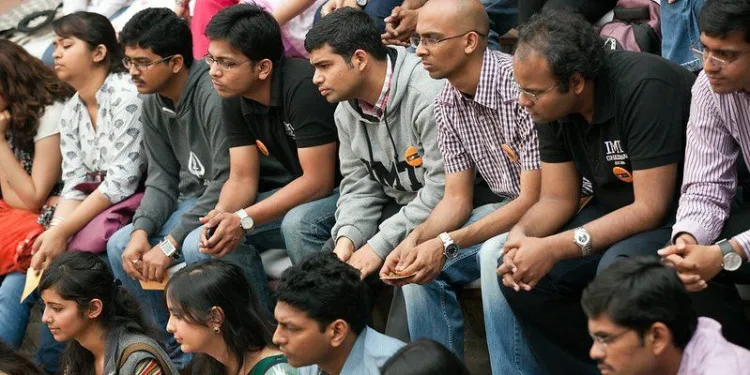India is currently battling with the challenge of youth unemployment due to a decrease in white-collar positions within its information technology industry, resulting in a significant number of recent graduates and young individuals being without jobs.
“We’ve seen consistently high growth of the economy, but I don’t think employment has kept up the pace,” Chandra Garisa, CEO of recruitment firm Foundit said, explaining that white-collar job availability, especially in the IT sector, has been on a decline.
He also told CNBC that; “One of the largest segments that employ white-collar employees is IT and services, and hiring in the sector has slowed down quite a bit,”.
As automation and artificial intelligence adoption picks up pace, many roles in IT are becoming redundant — a phenomenon that’s not restricted to India.
“Earlier, the vast majority of college graduates used to be hired for basic skills, but now those basic skills are being taken care of by technology,” Garisa noted.
According to the data provided by Foundit, there was a significant decrease of 18% in online hiring for both IT hardware and software sectors in the previous year, compared to 2022. Among the 14 sectors analyzed in the study, IT experienced the largest decline in hiring activity. Additionally, there was an overall decrease of 5% in job postings in 2023 compared to the previous year.
Also Read: How You Can Leverage Legal AI for Justice
“There is a mismatch between demand and supply of jobs and it is becoming a larger social issue in India,” Suyash Rai, deputy director and fellow at Carnegie India said.
The Ministry of Electronics and IT reported that the IT industry had a workforce of 5.4 million individuals by the conclusion of the fiscal year in March 2023.
Skills Mismatch
According to Garisa, he said, “Youth unemployment in India is also driven by a “transitory mismatch of skills” as many students are equipped with skills for the IT sector, but job creation is happening in the manufacturing industry”.
“Two big things are creating a skills mismatch — shift in demand across sectors which are opening up more opportunities, and advancements in technology which is making basic skills irrelevant,” he added.
In February, there was a 6% rise in job postings in the manufacturing sector compared to the previous month while IT postings fell by 9%, according to Foundit.
“The sectors which were hiring traditionally in the past are not the same ones which are growing and hiring now,” Garisa said. “What is being demanded from a fresh graduate now is very different from five years back, or even two years back.”
For instance, jobs in the manufacturing sector that required AI skills rose by 21% last year from just 8% in 2022, with positions for data analysts and junior technical software engineers seeing the highest jumps, according to Foundit.
Garisa also highlighted that there is still a perception among the youth that careers in the manufacturing sector are not as good as those in IT— which means some candidates might not be able to capitalize on the emerging new jobs.
“That’s changing, but it needs to change a lot more for outgoing graduates from college to really look at these as quality career opportunities.”
Youth unemployment rates in India
In the final quarter of last year, India saw a concerning rise in youth unemployment rates. Among those aged 20 to 24, unemployment increased to 44.49%, up from 43.65% in the previous quarter. Similarly, for individuals aged 25 to 29, the rate rose to 14.33% from 13.35%. These figures, reported by the Centre for Monitoring Indian Economy, highlight the challenges faced by India’s large youth population, which is the world’s most populous.
Despite these challenges, India continues to witness significant educational enrollment, with 43.3 million students enrolled in universities by the fiscal year ending March 2022, according to government data. This reflects the country’s ongoing investment in education and the aspirations of its youth for higher learning and skill development.
As India grapples with rising unemployment, addressing this issue becomes crucial for sustainable economic growth and social development. Initiatives focusing on skill enhancement, job creation, and entrepreneurship can play a pivotal role in harnessing the potential of India’s youthful workforce and driving inclusive prosperity.
Written by Adeluola Biola










